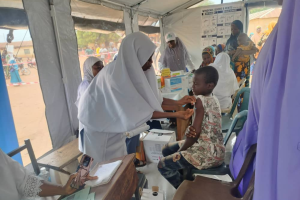WHO supports health response in flood affected Mokwa, Niger State
Minna, 28 June, 2025 - In response to severe flooding that displaced thousands and disrupted health services in Mokwa Local Government Area of Niger State, the World Health Organization (WHO) is working closely with state authorities and partners to address urgent health needs and restore access to essential care.
Triggered by intense rainfall, the flooding submerged several communities, damaged infrastructure, and disrupted healthcare delivery. According to a joint assessment by the Niger State Ministry of Health and WHO, no primary health care centre was rendered completely non-functional; however, five sustained varying degrees of damage, and up to 44 others across affected wards may also require support.
As floodwaters receded, Mokwa General Hospital and some private clinics resumed trauma and surgical services.
Addressing heightened health risks
WHO’s public health situation analysis indicates an increased risk of disease outbreaks such as cholera, typhoid, malaria, and skin infections. Health authorities are also monitoring concerns related to malnutrition, injuries, and the worsening of noncommunicable diseases, including hypertension and diabetes.
Delivering lifesaving care to displaced families
In collaboration with the Niger State Ministry of Health, WHO and partners have deployed mobile medical teams and supported the establishment of a health camp at Kpege Primary School, now serving as temporary shelter for displaced families.
Aisha Abubakar, 27, whose home was destroyed, has been living at the camp.
“We lost everything,” she said. “Twenty members of my household were affected, and eight are still missing. The children are constantly exposed to mosquito bites, and we’ve had no food.”
She sought help at the clinic when her child developed a fever.
“My child was treated for malaria, and we received cooked food and hygiene kits. The medication helped reduce the fever quickly, and the hygiene items helped us stay clean despite the situation.”
Musa Abdullahi, 31, now living in an unfinished building with his family of eight, shared a similar story.
“The flood swept away all our belongings. When my child fell ill, we visited the WHO-supported clinic and received free malaria treatment and hygiene kits. The health support and food relief are helping us survive. What we need now is shelter and a way to rebuild our lives.
Strengthening the response with supplies and coordination
To support ongoing efforts, WHO has delivered three Inter-agency Emergency Health Kits (IHEK 2017) for basic and malaria treatment, along with cholera modules, oral rehydration salts, infrared thermometers, personal protective equipment, and handwashing facilities. These supplies are expected to benefit over 3,000 people in affected communities.
“Given the elevated health risks following flooding, timely action is critical to preventing disease outbreaks and saving lives,” said Dr Ann Fortin, WHO Nigeria Emergency and Response Preparedness Cluster Lead.
“We are working in close coordination with the Niger State Government to restore access to care, strengthen disease surveillance, and uphold the health and dignity of displaced populations.”
WHO also supported the activation of the State Emergency Operations Centre (EOC) to facilitate partner coordination, data sharing, and rapid planning.
Dr Ibrahim Dangana, Commissioner for Health, Ministry of Primary Health Care, acknowledged the significant strain on the local health system. “We deeply appreciate WHO’s swift intervention. This support is helping us reach vulnerable families and prevent avoidable outbreaks.”
Comrade Abdullahi B. Arah, Director of the Niger State Emergency Management Agency, added:
“Despite infrastructure and access challenges, our teams are committed to reaching affected communities. The collaborative response led by WHO and partners is already having a positive impact.”
Looking ahead: Building resilience
Beyond the immediate response in Mokwa, WHO is working to strengthen Nigeria’s emergency preparedness and response capacity by deploying trained medical teams, expanding outbreak surveillance, and advocating for additional resources through the WHO Contingency Fund for Emergencies (CFE). These efforts aim to sustain the current response and enhance resilience to future flooding and public health threats.
This emergency response to Mokwa was made possible with funding support from the Government of Japan.
